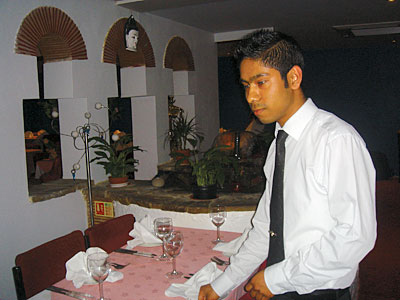 CHARLOTTE BAILEY |
"I wouldn't have come if I had known." The young Nepali woman in front of me tosses her black hair to a side and looks directly into my eyes. Speaking during her lunch break at college, where she is studying for a diploma in Business and IT, Sachita is commenting on the reduction in the hours that overseas students can legally work in the UK.
As of March last year, foreign students on a course below degree level can only work 10 hours a week, down from 20. Anyone with a visa issued before March can continue to work upto 20 hours until the visa comes up for renewal. This is understandably worrying for a lot of students already committed to two or three-year courses.
"Working 20 hours, we can afford to pay our rent and eat – that's it", Sachita tells me. "On 10 hours, we won't be able to do even that...it's hard to live in this place."
The restrictions also make finding a job more difficult in the first place, as many employers won't take on people who are limited to working 10 hours.
The result is an unexpected drain on resources back home, with students left with little option but to ask their parents for money. "It's fine to ask my parents for help with fees," she continues, shaking her head. "But you feel shame asking for money for everyday living expenses."
The alternative is to return to Nepal before completing the course.
"I cannot go on like this," says another student, Padma. He is already on 10 hours a week. "My parents cannot afford it." Things aren't going to get any easier for students like Sachita and Padma (see box).
Recent announcements made by the UK Home Office mean that from April 2012, overseas students in privately funded colleges will not be able to work at all.
The policy of cutting legal working hours for overseas students is intended to reduce fraud within the system. The UK government wants to ensure that those who enter on a student visa genuinely come here to study, not to work or with a view to settling here. The government cites evidence that shows that 26 per cent of students in private institutions are 'non-compliant' with the terms of their visa.
Sarah Mulley, Associate Director of Migration, Trade and Development at the Institute of Public Policy Research, says the Home Office has not been clear about exactly what problem the policy is designed to address. She fears the measure is part of a wider plan to reduce the number of students coming into the country.
But there is also the risk that it may push overseas students into illegal work, where they won't be protected by UK employment law, including the minimum wage.
"We come here for our own development, not to work," another indignant Nepali student says. "We work only to support ourselves while we are here."
The Home Office, though, believes that for too many people, this is not the case.
The students say goodbye to me and pick up their bags from the restaurant floor. They don't want to be late for class.
PADMA
Padma left Swayambhu, Kathmandu in 2009. Equipped with a visa that entitled him to work 20 hours a week, he began a course in Business and IT at North West College in Reading. Working at the fast-food chain Subway, he earned about £450 (Rs 52,000) a month. This covered the £220 he pays for rent, £50 for bills, £90 for food, and £40 for travel, with some left over to spend time with his friends. With the recent changes, he now earns only £220, which means a shortfall of £180 every month. At the moment he is borrowing money from friends, but this is obviously not sustainable.
Padma confesses that even before the reduction in legal working hours he found it unexpectedly difficult in the UK. He accuses the education consultancy he sought advice from in Nepal of deliberately misleading him.
"I think they did it on purpose – they told me things that turned out not to be true...things like we could work as much as we needed to." Such consultancies take a cut of the fees when they successfully recruit a student for a UK college. They don't have an incentive to tell the truth about life in Britain.
Since his family can't afford to provide him with any additional financial support, Padma will probably return to Nepal before finishing his course. "It is miserable for me here," he says. "It is like they are trying to make our lives as hard as possible so we have no choice but to go home."


